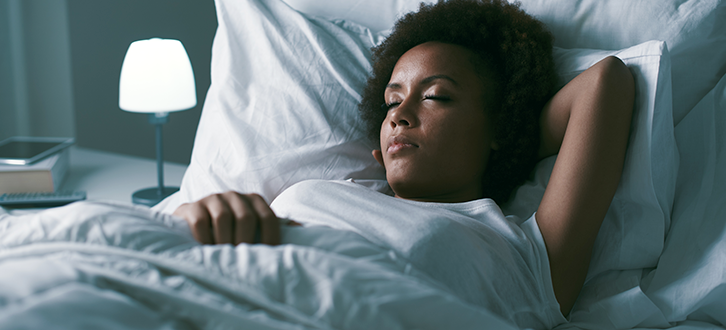Knowing the risks of sleep apnea
Author: CenterWell Pharmacy
Date Posted: March 13, 2024

After a long day, there’s nothing better than getting some rest. But, if you have sleep apnea, sleep often isn’t restful.
More than 120 million adult Americans snore, and sleep apnea affects up to 70% of those snorers.¹ Sleep apnea causes you to temporarily stop breathing while sleeping. These pauses in breathing can last for several seconds or minutes and can happen 30 or more times an hour, lowering the quality of your sleep.²
Sleep apnea also increases your risk of developing high blood pressure.
We’re here to help you learn more about the condition, its symptoms and how to manage them.
Who experiences sleep apnea
Anyone can have sleep apnea, but it becomes more common in adults as they grow older. About 10%–30% of adults have sleep apnea, although many don’t realize it and go undiagnosed.³ It affects males 2–3 times more than females,⁴ though females who have gone through menopause are at greater risk. Also, some research shows that sleep apnea affects African Americans at a younger age.⁵
Other risk factors include being overweight, having certain heart and lung conditions, a larger tongue or shorter jaw, a narrowed airway,⁴ drinking alcohol, using sedative drugs and smoking.⁶
Different types of sleep apnea
There are 3 types of sleep apnea:
- Obstructive sleep apnea (OSA) blocks airflow to the lung, causing you to snore loudly and wake up multiple times gasping for air. OSA is the most common type of sleep apnea affecting 4–7% of the general population and 30–40% of people with high blood pressure.⁷
- Central sleep apnea (CSA) causes problems with how the brain communicates with breathing muscles. CSA develops in 30–50% of people with heart failure.⁷
- Complex sleep apnea happens when people diagnosed with OSA develop CSA during treatment for OSA.⁴
The symptoms of OSA and CSA can overlap, which can make it hard to determine the type of sleep apnea someone has. Common symptoms include:⁴
- Chronic, loud snoring
- Abnormal breathing patterns
- Waking up with dry mouth
- Gasping for air while sleeping
- Excessive daytime sleepiness
- Difficulty staying asleep
- Morning headaches
If you think you have sleep apnea, please talk to your healthcare provider. They may do an overnight sleep test to confirm a sleep apnea diagnosis.⁸
Sleep apnea and high blood pressure
Obstructive sleep apnea is associated with high blood pressure (hypertension) because the pauses in breathing can trigger the body’s stress response, also known as the “fight or flight” response. This leads to chronic stress and increased blood pressure. If OSA is left untreated, it can increase the risk for hypertension and heart disease.⁷
It can also contribute to:
- Stroke
- Depression
- Type 2 diabetes
- Chronic fatigue
- Liver problems
Central sleep apnea isn’t known to increase blood pressure.⁷
Treating sleep apnea and high blood pressure
A night of restful sleep and healthier blood pressure are possible with the right treatment and some lifestyle changes. Take a proactive step towards improved sleep and overall health by reaching out to CenterWell Senior Primary Care®.
Your healthcare provider may recommend lifestyle changes like losing weight, being more active or quitting smoking. They may also suggest wearing a continuous positive airway pressure (CPAP) machine to improve your breathing during sleep.⁶ If you have an MAPD or PDP Humana plan, you can order a CPAP machine from our over-the-counter store.
If you have high blood pressure, your healthcare provider may prescribe blood pressure medications that—when taken as directed—can help lower your blood pressure.
If your healthcare provider prescribes you a blood pressure medication, it’s quick and easy to fill your prescription with CenterWell Pharmacy®.
Disclaimer: This material is provided for informational use only and should not be construed as medical advice or used in place of consulting a licensed medical professional. You should consult with your doctor to determine what is right for you.
Sources:
- “100+ Sleep Statistics,” Sleep Foundation, last accessed Feb. 20, 2024.
- “Sleep Apnea,” MedLine Plus, last accessed Feb. 13, 2024.
- “Treatment for Obstructive Sleep Apnea,” American Sleep Apnea Association, last accessed Feb. 20, 2024.
- “Sleep apnea,” Mayo Clinic, last accessed Feb. 20, 2024.
- “What’s the Connection Between Race and Sleep Disorders?” Sleep Foundation, last accessed Feb. 20, 2024.
- “Sleep Apnea,” Sleep Foundation, last accessed Feb. 13, 2024.
- “How Sleep Apnea Affects Blood Pressure,” Sleep Foundation, last accessed Feb. 20, 2024.
- “Obstructive Sleep Apnea,” American Sleep Apnea Association, last accessed Feb. 20, 2024.